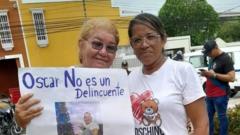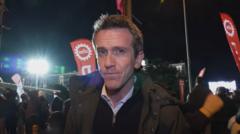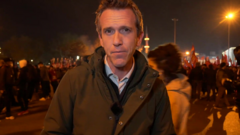**As the plight of deported Venezuelans intensifies, families express heartbreak over disappearing loved ones trapped in an unraveling judicial and human rights crisis.**
### Venezuelan Families in Agony as Deportations Lead to 'Black Hole' Prisons

### Venezuelan Families in Agony as Deportations Lead to 'Black Hole' Prisons
**Grieving families demand answers as 238 Venezuelans face harsh conditions in El Salvador's mega-jail following US deportations.**
---
Gertrudis Pineda's despair for her son Oscar, one of 238 Venezuelans deported by the U.S. to a maximum-security prison in El Salvador, has highlighted the pain of families caught in a desperate situation. "My son went searching for the American Dream, and now he's stuck in a nightmare," she cries, detailing Oscar's life before his detention, where he supported his family by laying carpets in Dallas, Texas.
Gertrudis, speaking from Zulia state in Venezuela, faces the harsh reality of being 1,800 km from her son, who is now imprisoned in the Cecot—El Salvador’s infamous "Terrorism Confinement Centre," designed for notorious gang members. The U.S. government has linked the detainees to the Tren de Aragua gang, yet many, including Oscar, had no prior criminal records.
She learned of his deportation through her other son living in Colombia, who saw Oscar's name broadcast on television. Images of the detainees, having their heads shaved upon arrival, further deepened her anguish. “There are so many innocent boys in there,” Gertrudis insists, urging advocates to recognize the violation of their human rights. The White House maintains that the deported individuals were properly vetted and deemed dangerous.
However, criticism continues to arise in both the U.S. and El Salvador, as legal experts argue that bringing detainees without criminal ties to El Salvador violates constitutional rights. Salvadoran immigration specialist Napoleon Campos suggests a significant number of the Venezuelans have clean records. The situation is likened to a “black hole” of rights violations.
For Gertrudis, the pain is compounded by a lack of communication regarding her son’s well-being since he was forcibly taken away. The last confirming information she received depicted Oscar in shackles at the Cecot, which is described by President Nayib Bukele as a necessary measure against gang violence, though human rights activists label it an abyss of suffering.
Venezuelan authorities have intervened, with Jaime Ortega being appointed to negotiate for the detainees' release, although he admits navigating the complex legal landscape remains daunting. The Salvadoran government's unyielding stance, especially under Bukele’s extended state of exception, has led to mass arrests, further complicating the landscape of legality and justice.
Residents of neighborhoods previously dominated by gangs report a notable change since the state of exception took effect. However, many maintain that innocent individuals have also been swept up in the crackdown. Gertrudis feels a deep kinship with other families of Salvadorans wrongfully imprisoned in Cecot, highlighting a shared agony among mothers across borders.
"My son deserves to answer for his actions here, not be kidnapped by a government," she fervently states. As the situation unfolds, the families of the deported Venezuelans continue to advocate for their loved ones, striving for a semblance of hope amid an ongoing crisis.
Gertrudis Pineda's despair for her son Oscar, one of 238 Venezuelans deported by the U.S. to a maximum-security prison in El Salvador, has highlighted the pain of families caught in a desperate situation. "My son went searching for the American Dream, and now he's stuck in a nightmare," she cries, detailing Oscar's life before his detention, where he supported his family by laying carpets in Dallas, Texas.
Gertrudis, speaking from Zulia state in Venezuela, faces the harsh reality of being 1,800 km from her son, who is now imprisoned in the Cecot—El Salvador’s infamous "Terrorism Confinement Centre," designed for notorious gang members. The U.S. government has linked the detainees to the Tren de Aragua gang, yet many, including Oscar, had no prior criminal records.
She learned of his deportation through her other son living in Colombia, who saw Oscar's name broadcast on television. Images of the detainees, having their heads shaved upon arrival, further deepened her anguish. “There are so many innocent boys in there,” Gertrudis insists, urging advocates to recognize the violation of their human rights. The White House maintains that the deported individuals were properly vetted and deemed dangerous.
However, criticism continues to arise in both the U.S. and El Salvador, as legal experts argue that bringing detainees without criminal ties to El Salvador violates constitutional rights. Salvadoran immigration specialist Napoleon Campos suggests a significant number of the Venezuelans have clean records. The situation is likened to a “black hole” of rights violations.
For Gertrudis, the pain is compounded by a lack of communication regarding her son’s well-being since he was forcibly taken away. The last confirming information she received depicted Oscar in shackles at the Cecot, which is described by President Nayib Bukele as a necessary measure against gang violence, though human rights activists label it an abyss of suffering.
Venezuelan authorities have intervened, with Jaime Ortega being appointed to negotiate for the detainees' release, although he admits navigating the complex legal landscape remains daunting. The Salvadoran government's unyielding stance, especially under Bukele’s extended state of exception, has led to mass arrests, further complicating the landscape of legality and justice.
Residents of neighborhoods previously dominated by gangs report a notable change since the state of exception took effect. However, many maintain that innocent individuals have also been swept up in the crackdown. Gertrudis feels a deep kinship with other families of Salvadorans wrongfully imprisoned in Cecot, highlighting a shared agony among mothers across borders.
"My son deserves to answer for his actions here, not be kidnapped by a government," she fervently states. As the situation unfolds, the families of the deported Venezuelans continue to advocate for their loved ones, striving for a semblance of hope amid an ongoing crisis.





















